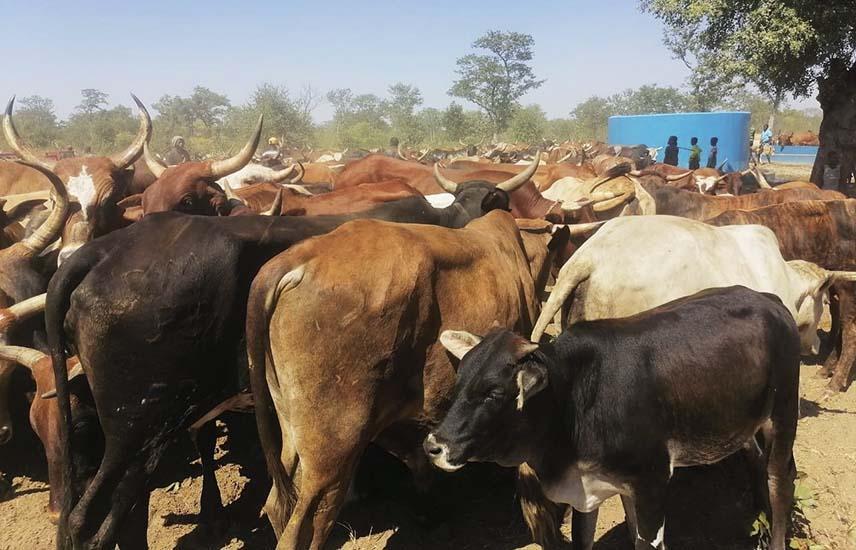Africa-Press – Botswana. The Ramatlabama National Artificial Insemination (AI) Laboratory and Training Farm is making significant strides toward meeting the World Organisation for Animal Health (WOHA) standards.
The progress was highlighted during a benchmarking exercise at the Ramatlabama Artificial Insemination Centre, led by the acting Leader of the Opposition, Mr Taolo Lucas, accompanied by members of parliament from Malawi on July 9.
In an interview on the sidelines of the main plenary, Ministry of Lands and Agriculture, acting director of Animal Production, Mr Aubrey Ranko, said achieving WOHA standards would enable the facility to export locally produced semen to other African countries and potentially beyond.
Mr Ranko said the development was crucial for enhancing livestock breeding practices, improving genetic diversity, and supporting the agricultural economy in the region.
As the laboratory approaches completion of its requisites, Mr Ranko noted that it was poised to play a vital role in advancing livestock production, promoting food security and fostering trade relationships within the continent and internationally, something that could potentially lead to increased investment in the agricultural sector, benefiting local communities and economies.
In the process of meeting WOHA standards, Mr Ranko said the facility had already introduced fencing and biosecurity measures, with plans to standardise the processes of semen tapping and processing in the future.
He acknowledged that these efforts were progressive in nature, and more work would still be required to satisfy due diligence measures, including staffing as a key requirement.
He said in 2023 and 2024, the government had invested in the centre by purchasing cattle from Texas and Australia, which housed the best genetic material in the country for the AI programme.
The Malawian delegation in particular, was interested in the types of breeds maintained at the farm, their acclimatisation to African weather conditions, and the semen tapping process, he said.
The breeds at the facility include Brahman, Simmental, Charolais, Beefmaster, Droughtmaster, and Tswana cattle, exclusively available as semen.
Mr Ranko explained that the delegation was especially interested in the farmer capacity-building aspects conducted onsite, where they trained farmers on AI techniques and beef productivity, addressing livestock diseases, nutrition, and business coaching to empower farmers to establish their own businesses.
Ramatlabama National Artificial Insemination Laboratory and Training Centre’s superintendent, Ms Claudina Pilane explained that the laboratory’s primary mandate was to train farmers in artificial insemination technologies, livestock management, and husbandry practices, along with beef productivity.
Opportunities provided through the centre include helping farmers improve their livestock breeding and since many local farmers primarily keep Tswana breeds, the aim is to diversify to achieve a more competitive market, especially with the Botswana Meat Commission, Ms Pilane said. She noted that the value of the exported meat had increased due to its rich content from animals that primarily grazed on grass therefore, utilising AI technologies, farmers could achieve improved heifers and weaners, thereby enhancing beef production.
The focus on training aims to empower farmers to perform AI independently, minimising reliance on government camps that limit the number of animals that can be bred at one time.
Additionally, Ms Pilane said the programme contributed to increasing the national herd and provided farmers with sexed semen for dairy production, bolstering the supply of female livestock for milk production.
She said currently, efforts were underway to accredit technical officers involved in the programme, and plans to construct a larger training auditorium and refurbish learner accommodation facilities were in progress.
Malawi’s leader of opposition, Dr George Chaponda appreciated how Botswana exceeded its expectations during the facility tour and stressed the importance of African states to learn from each other›s experiences.
Dr Chaponda stated that the insights gained from the tour would be invaluable for Malawi in diversifying its agricultural sector for economic improvement.
Mr Lucas said reciprocally, Botswana could learn significant lessons from Malawi’s agricultural practices, where investment had not yet reached optimal economic output.
For More News And Analysis About Botswana Follow Africa-Press






